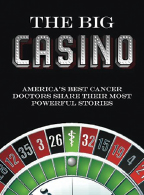
The following essay by Robert J. Green, MD, is adapted, with permission, from The Big Casino: America’s Best Cancer Doctors Share Their Most Powerful Stories, which was coedited by Stan Winokur, MD, and Vincent Coppola and published in May 2014. The book is available on Amazon.com and thebigcasino.org.
The picture is behind my desk in the same place I put it after it was sent to me. Lenny and I are standing side by side, having just finished running a 5K race for a nonprofit foundation affiliated with my oncology practice. I didn’t expect to see him there. I knew he had been a runner. In fact, he’d been running marathons before I knew how to tie shoelaces on a pair of sneakers. But the idea that he would be there on that day was almost outrageous.
But there we are, both sweating and tired, though only one of us is 80 and only one of us is in the midst of chemotherapy for metastatic cancer. I saw the picture for the first time a year after it had been taken. Lenny had died, but in his memory, his family had returned to the race wearing T-shirts filled with photos of Lenny. In one of the many pictures on the shirt, there was one of Lenny and me rejoicing in a race well run, another obstacle overcome. The picture behind my desk of the two of us at the finish line was one of a sea of images of a man who knew what to do with the challenges life throws at us.
Stories of Hope, Courage, and Love
The most common questions I’m asked—and I suspect this is true of many oncologists—involve themes like, “How can you do this day after day? Isn’t it so depressing taking care of patients with cancer?” The answers used to be difficult, but after 15 years, and patients like Lenny, they have become easier. If you grew up or were a parent in the 1970s, you probably saw the ABC television network’s after-school specials, which were shows trying to teach life lessons. As I remember them, they were too corny and fake to ever be believable. Now years later, my days are filled with those types of life episodes and stories of hope, courage, resiliency, caring, and love. Almost too trite to be real, but they are.
The most difficult part of my job is helping people understand the disease does not define them.— Robert J. Green, MD
Tweet this quote
Today, Lenny still stares at me from behind my desk. Most people think the toughest part of my job is telling people they have an incurable disease, a disease that will kill them. And that may be true, but the most difficult part of my job is helping people understand the disease does not define them.
For Lenny, this actually wasn’t hard to do. Our tough talks focused on negotiations about rescheduling chemotherapy treatments to fit his softball team’s schedule or the need for him to hydrate well when exercising on a hot day. Lenny found that very hard-to-reach place within himself to cope with his cancer. He discovered somewhere deep inside himself the place where he could balance desire to live long with the desire to live fully.
Isn’t that what we all strive for, cancer or no cancer?
He balanced quality of life and duration of life and made chemotherapy an interruption in his life, not life an interruption in his chemotherapy. In my office, every day is like an ABC after-school special. Stories that seem too inspiring or too heart wrenching to be true are.
Life Lessons
And from every story, from every Lenny, I try to learn the lessons that cancer patients teach us every day. I learn how we fight despite bad odds. I learn how we accept reality when things don’t happen the way we want them to. I learn how we are grateful for cures and how we show grace and love to family and others when cure is elusive. I learn when it is time to fight and when it is time to run. I learn there is a time to know that the race is over and that there is grace in accepting you have made it to the finish line and that the true challenge in life is to find the moments of celebration in it all.
To all the Lennys in my life, thank you. ■
Dr. Green is a medical oncologist at Florida Cancer Specialists and Research Institute in West Palm Beach, Florida, and Vice President of Clinical Strategy at Flatiron Health.

